Results 1 to 2 of 2
Thread Information
Users Browsing this Thread
There are currently 1 users browsing this thread. (0 members and 1 guests)
-
09-17-2014, 05:14 PM #1
The drug cartel of big U.S. pharmaceutical companies
WEDNESDAY, SEP 17, 2014 06:18 AM PDT
Must-see morning clip:
“The Daily Show” explores the drug cartel of big pharma
The top 5 pharmaceutical companies are being sued by two CA counties for spreading misinformation about their drugs VIDEO
PRACHI GUPTA
TOPICS: VIDEO, BIG PHARMA, PHARMACEUTICAL COMPANIES, DRUGS, MICHAEL CHE, MUST SEE MORNING CLIP, THE DAILY SHOW, ENTERTAINMENT NEWS

In what must be one of his final segments for the show before he moves to “SNL,” unassuming “Daily Show” correspondent Michael Che goes after the biggest drug cartel in America: the pharmaceutical companies. After talking to representatives working on behalf of California’s Orange and Santa Clara Counties, who are suing the top five pharma companies for disseminating misinformation about the risks of prescription painkillers and narcotics, Che stages a few not-so-covert meet-ups with informants to uncover the truth.
The Daily Show
Get More: Daily Show Full Episodes,The Daily Show on Facebook,Daily Show Video Archive

Prachi Gupta is an Assistant News Editor for Salon, focusing on pop culture. Follow her on Twitter at @prachigu or email her at pgupta@salon.com.
http://www.salon.com/2014/09/17/must...of_big_pharma/
NO AMNESTY
Don't reward the criminal actions of millions of illegal aliens by giving them citizenship.
Sign in and post comments here.
Please support our fight against illegal immigration by joining ALIPAC's email alerts here https://eepurl.com/cktGTn
-
09-17-2014, 05:27 PM #2
Chicago and 2 California Counties Sue Over Marketing of Painkillers
By JOHN SCHWARTZAUG. 24, 2014
As the country struggles to combat the growing abuse of heroin and opioid painkillers, a new battlefield is emerging: the courts.
The City of Chicago and two California counties are challenging the drug industry’s way of doing business, contending in two separate lawsuits that “aggressive marketing” by five companies has fueled an epidemic of addiction and cost taxpayers millions of dollars in insurance claims and other health care costs.
The severity of drug abuse is well documented: Use of prescription opioids contributed to 16,651 deaths in the United States in 2010 alone, and to an estimated 100,000 deaths in the past decade. When people cannot find or afford prescription painkillers, many have increasingly turned to heroin.
The lawsuits assert that drug makers urged doctors to prescribe the drugs far beyond their traditional use to treat extreme conditions, such as acute pain after surgery or injury or cancer pain, while underplaying the high risk of addiction. Such marketing, the plaintiffs say, has contributed to widespread abuse, addiction, overdose and death.
Taking the drug makers to court recalls the tobacco liability wars of the 1990s, with government entities suing in the hope of addressing a public health problem and forcing changes from an industry they believed was in denial about the effects of its products. The tobacco settlement led to agreements by the tobacco industry to change marketing practices, which is a goal of the opioid lawsuits.
But there are differences: The $246 billion tobacco settlement involved a product that was at best lightly regulated, while narcotics are already heavily regulated by federal and state government. Still, the private law firms that have filed the opioid suits, including the public-interest firm Cohen Milstein Sellers & Toll, have encouraged governments to join their fight.
The Chicago lawsuit cites an estimate that about 1,100 emergency room visits in the city in 2009 could be attributed to opioid abuse and overdose, with the city paying $9.5 million in insurance claims for prescriptions since 2008 and much more in related health care costs.
Chicago’s Opioids Complaint
The Chicago lawsuit against five drug companies over their marketing of painkillers cites an estimate that about 1,100 emergency room visits in the city in 2009 could be attributed to opioid abuse and overdose.
DOCUMENT
PAGES
TEXT
p. 1
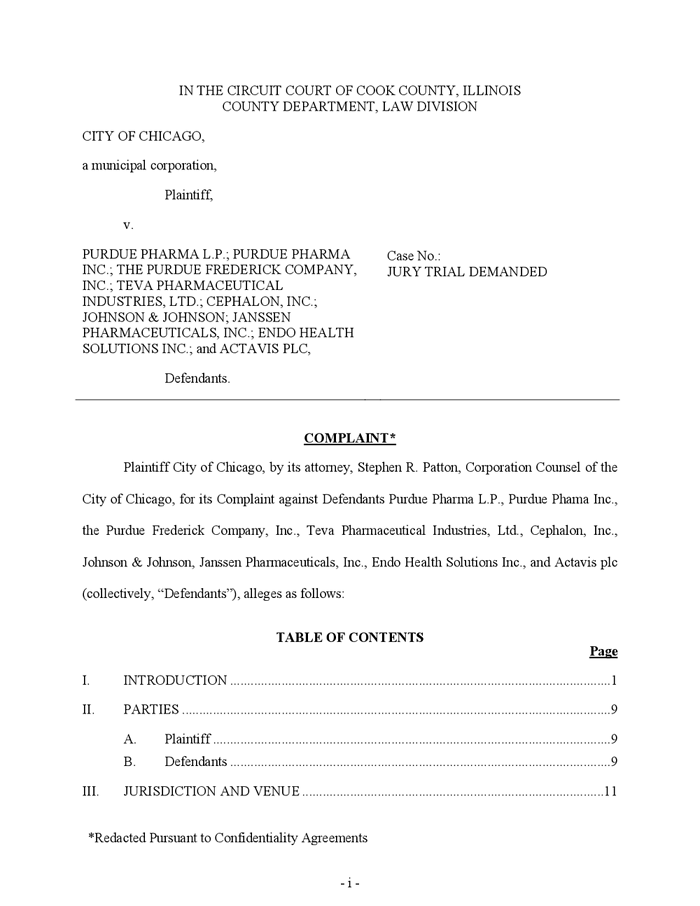
p. 2
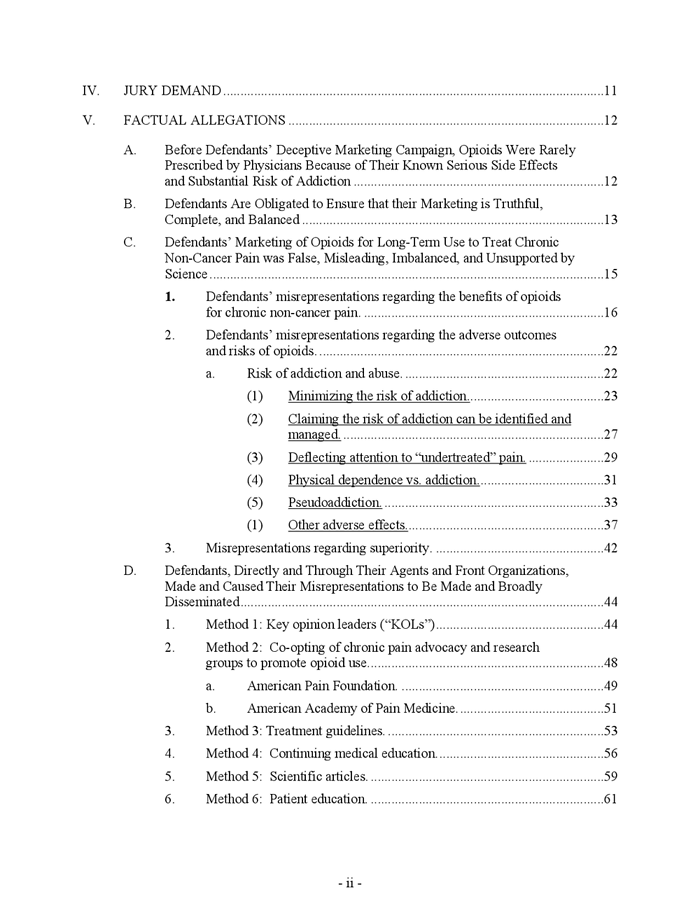
p. 3
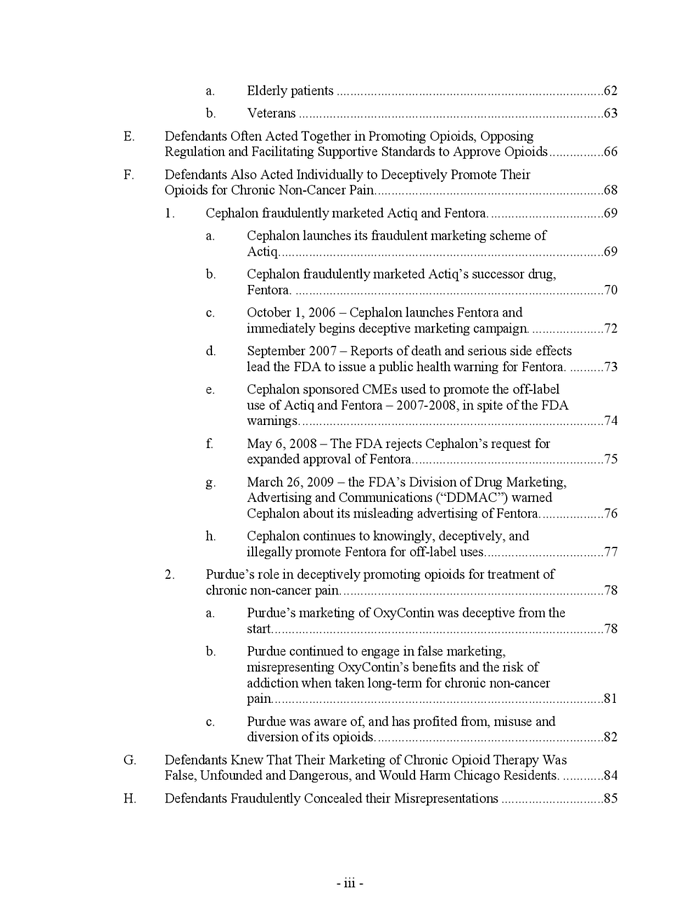
«Page 1 of 126»
Circuit Court of Cook County, Illinois
Continue reading the main storyRELATED COVERAGE

Prescription Painkillers Seen as a Gateway to HeroinFEB. 10, 2014

Sharp Rise in Women’s Deaths From Overdose of PainkillersJULY 2, 2013
- F.D.A. Shift on Painkillers Was Years in the Making
OCT. 27, 2013

F.D.A. Urging a Tighter Rein on PainkillersOCT. 24, 2013
- To Cut Abuse, F.D.A. Is Altering Painkiller Label Rules
SEPT. 10, 2013
- Chicago Said to Weigh Suit Over Marketing of Painkillers
NOV. 14, 2013
- In Guilty Plea, OxyContin Maker to Pay $600 Million
MAY 10, 2007
Investigators have reviewed hundreds of thousands of pages of internal corporate documents that they obtained through subpoenas under local ordinances. Stephen Patton, corporation counsel for the City of Chicago, said, “It was a suit we would not have brought unless we felt we had a rock-solid legal and factual basis for doing so.”
The other lawsuit was filed in California by Orange and Santa Clara Counties. Five companies were named as defendants: Janssen Pharmaceuticals, a Johnson & Johnson pharmaceutical company that makes Duragesic and other opioids; Purdue Pharma, which makes OxyContin and other drugs; Actavis, the maker of Kadian and some generic opioids; Endo Health Solutions Inc., the maker of such opioids as Percocet and Opana; and Cephalon, a subsidiary of Teva Pharmaceutical Industries that makes such opioids as Actiq and Fentora.
RELATED IN OPINION
The opioids litigation was a topic of much discussion in June at the annual summer meeting of the National Association of Attorneys General in Mackinac Island, Mich., said William H. Sorrell, the Vermont attorney general. Noting that the governor of Vermont, Peter Shumlin, devoted most of his State of the State address to the growing problem of opioids and heroin addiction, Mr. Sorrell said, “we are taking a look at the issues” and the litigation.
Although the lawsuits, filed in state courts, tailor their arguments to local law and circumstances — Chicago used its consumer fraud ordinance to subpoena internal documents from the drug companies — they are similar. Both open by stating, “A pharmaceutical manufacturer should never place its desire for profits above the health and well-being of its customers.”
The materials obtained from the companies by Chicago include the industry’s funding of patient information groups. One of them, the American Pain Foundation, received $10 million from the companies and played down the addiction potential of the drugs, according to court filings, with messages to consumers such as, “opioids are rarely addictive when used properly for the management of chronic pain.”
This appears to conflict with an internal document from the pain foundation that discusses “the lack of confirmatory data about the long-term safety and efficacy of opioids in non-cancer chronic pain.”
One agreement cited in the lawsuit said that the foundation and Purdue Pharma “will work collaboratively to develop and approve key messages.”
Santa Clara and Orange Counties’ Opioids Complaint
The lawsuit asserts that drug makers urged doctors to prescribe the drugs far beyond their traditional use to treat extreme conditions, such as acute pain after surgery or injury or cancer pain, while underplaying the high risk of addiction.
DOCUMENT
PAGES
TEXT
p. 1
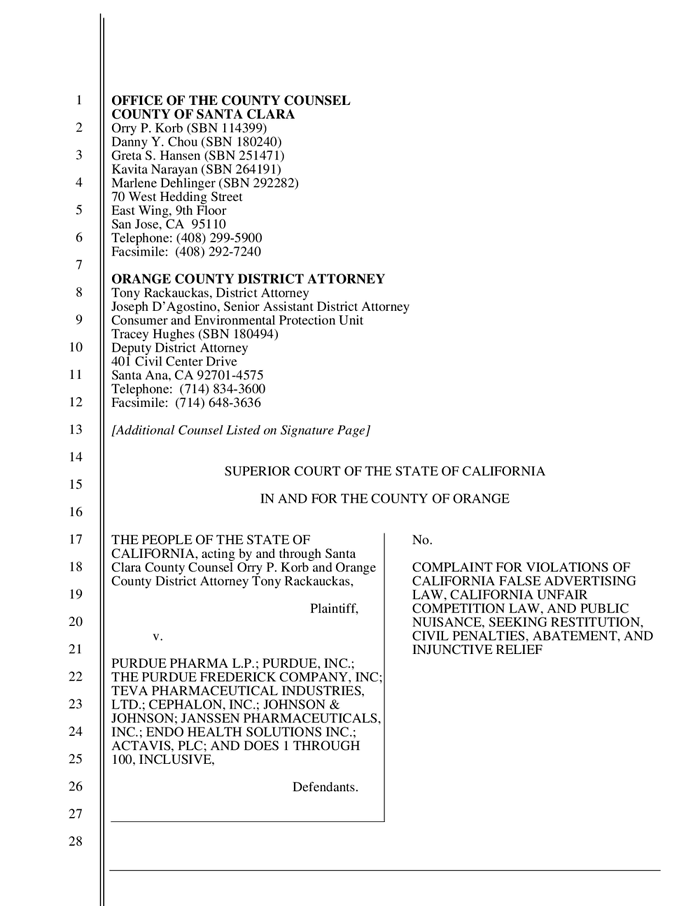
p. 2
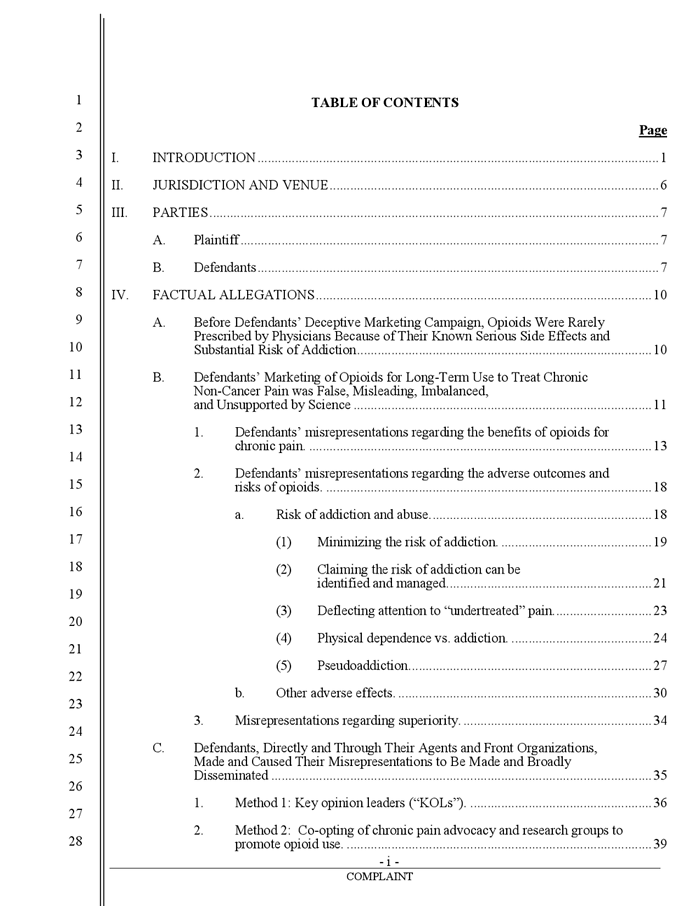
p. 3
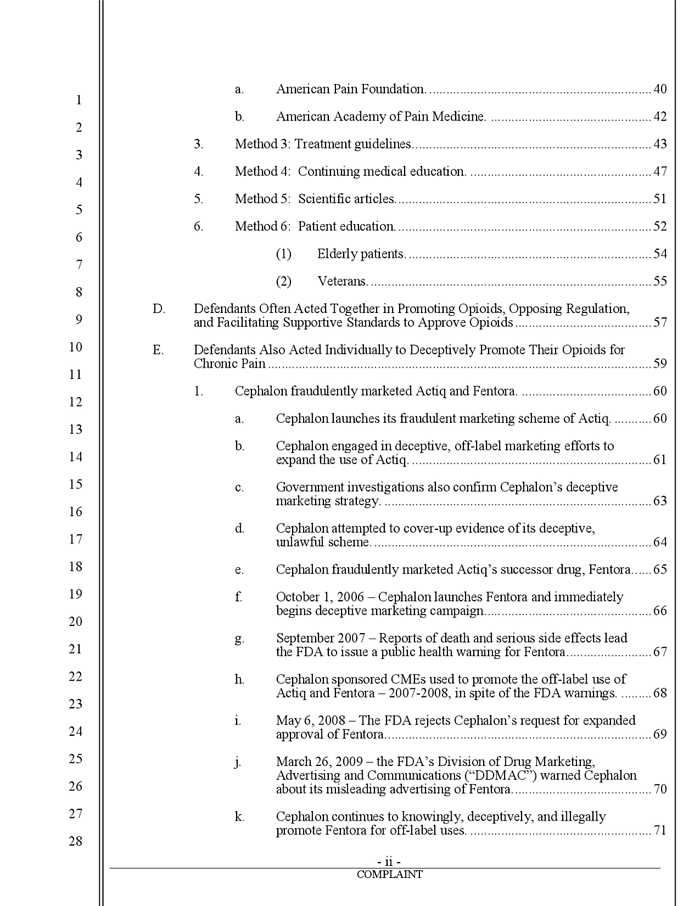
«Page 1 of 105»
Superior Court of the State of California
Tony Rackauckas, the district attorney for Orange County in California, said he is not trying to outlaw the drugs but “to require these companies to change their conduct and to tell people — to tell the doctors, to tell the patients — tell them that these drugs are dangerous. Tell them they are addictive, and you could overdose on them, and you could die.”
He said that using private law firms in cases like this one was necessary. “It’s going to require a lot of resources,” he said, and “when you’re bringing a case against companies that have substantial funds, they try to wear you down, basically, with paperwork.” The private firms provide deep expertise in mass litigation and the subject area.
Pharmaceutical companies declined to comment in detail about the lawsuits. Robyn Reed Frenze, a spokeswoman for Janssen, said, “We’re currently reviewing the complaint.” She said that “Janssen is committed to ethical business practices and responsible promotion, prescribing and use of all our medications.” Representatives of Actavis, Purdue Pharma and Teva said the companies would have no comment.
Purdue paid $655 million in settlements with the federal and state governments in 2007 over civil and criminal complaints related to the “misbranding” of OxyContin as having a low potential for abuse, but crushing a tablet and then snorting or injecting the powder produced an intense high. The company stopped shipping its original formulation in 2010. It created a new formula, approved by the Food and Drug Administration that same year, which the F.D.A. deemed more difficult to abuse by crushing and dissolving, though it stated that abuse “is still possible.”
The public health toll from the prescription of narcotic painkillers has only grown since then.
James Tierney, a former Maine attorney general who advised states during the tobacco litigation, expressed doubt that the opioid suits would ultimately draw many clients from among the ranks of state legal officials. Mr. Tierney said the officials are increasing enforcement of drug laws and monitoring doctors and pharmacies for signs of pill mills and Medicaid fraud. By comparison to the tobacco litigation, he said, the judicial process should be a last resort. “The tort system is so clumsy and unfocused,” he said.
The cases bear important differences, Mr. Tierney explained. “This is not tobacco,” he said. Opioids, he noted, are highly regulated products whose use can be tracked and which, when used properly, offer important benefits to patients. By comparison, tobacco was regulated lightly, and in the normal course of its use causes illness and death — facts that the industry long denied.
Still, Michael Moore, a former Mississippi attorney general who filed the first state case against the tobacco industry in 1994, said he was intrigued. “I definitely think it has potential,” he said. “I may get back involved.”
Correction: August 26, 2014
An article on Monday about lawsuits filed by the City of Chicago and two California counties that accuse drug companies of marketing tactics that have fueled an epidemic of addiction and cost taxpayers millions of dollars misspelled the surname of the district attorney for Orange County in California who is involved in one of the suits. He is Tony Rackauckas, not Rakaukas.
http://www.nytimes.com/2014/08/25/us...marketing.htmlNO AMNESTY
Don't reward the criminal actions of millions of illegal aliens by giving them citizenship.
Sign in and post comments here.
Please support our fight against illegal immigration by joining ALIPAC's email alerts here https://eepurl.com/cktGTn
Similar Threads
-
20 Signs That The Pharmaceutical Companies Are Running A 280 Billion Dollar Scam
By AirborneSapper7 in forum Other Topics News and IssuesReplies: 0Last Post: 06-21-2013, 04:52 PM -
FDA: Drug Companies Faked Thousands of Drug Documents
By AirborneSapper7 in forum Other Topics News and IssuesReplies: 0Last Post: 12-23-2012, 01:55 AM -
Main drug distributor for infamous drug cartel arrested in Mexicali
By JohnDoe2 in forum illegal immigration News Stories & ReportsReplies: 1Last Post: 12-21-2011, 09:56 PM -
CA. Valley drug bust leads to La Familia drug cartel
By JohnDoe2 in forum illegal immigration News Stories & ReportsReplies: 0Last Post: 11-08-2011, 10:54 PM -
Drug Companies Cant Make a Profit from FLU Shots!
By butterbean in forum General DiscussionReplies: 12Last Post: 11-09-2005, 12:21 PM


 LinkBack URL
LinkBack URL About LinkBacks
About LinkBacks




 Reply With Quote
Reply With Quote


Mike Johnson betrays border security for more foreign aid
04-18-2024, 10:31 PM in illegal immigration News Stories & Reports